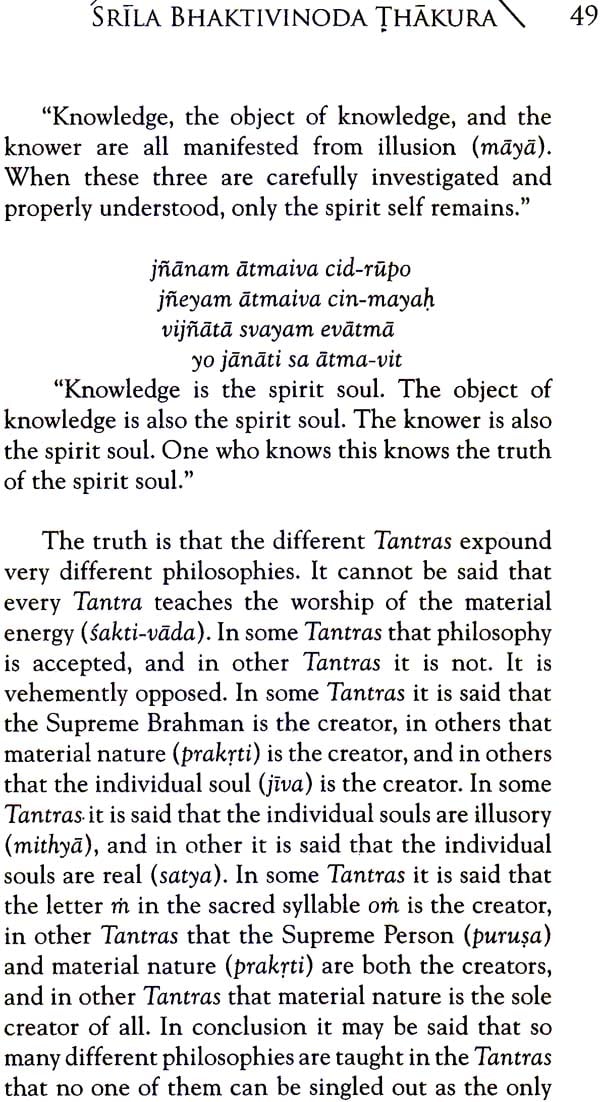
Tattva Viveka (Analytical Expositions of The Western And Eastern Philosophies)
Book Specification
| Item Code: | NAE508 |
| Author: | Srila Bhaktivinoda Thakura |
| Publisher: | RAS BIHARI LAL AND SONS |
| Language: | English |
| ISBN: | 9798184030531 |
| Pages: | 131 |
| Cover: | Paperback |
| Other Details | 8.5 inch X 5.5 inch |
| Weight | 170 gm |
Book Description
In the beginning of this book, Srila Bhaktivinoda Thakura writes, “Who am I? What is this world? What relation have I with this world?” To learn the truth, a soul in this material world will always ask himself these questions. He then says, “Because of their different natures, those who ask these questions attain a great variety of answers. Only a soul situated in his original spiritual form attains the true answers.”
The aim of philosophy is certainly to ascertain the truth regarding ourselves, this world, and our purpose in life. In this book is pointed out that throughout history there have been innumerable attempts to answer these questions and each is somewhat different because each philosopher has a different nature acquired by material conditioning. Thus, although the truth is one, we are presented with innumerable philosophies and thus may become confused.
Tattva-viveka was written in 1893. In this unique book, Srila Bhaktivinoda Thakura takes a look at innumerable philosophies, both Eastern and Western, and points out their mistakes. In the course of this short work, the author describes the Greek philosophers Leucippus, Democritus, Plato and Aristotle; Diderot and Lamettrie of France; Lucretius of Italy Von Holbach of Germany; Yangchoo of Carvaka of India; and Englishmen Mill, Lewis Paine, Carlyle, Bentham, and Combe.
In the beginning Srila Bhaktivinoda Thakura writes that “Who am I? What is this world? What relation have I with this world?” To learn the truth, a soul in this material world will always ask himself these questions. He then says, “Because of their different natures, those who ask these questions attain a great variety of answers. Only a soul in his original spiritual form attains the true answers.”
The aim of philosophy is certainly to ascertain the truth regarding ourselves, this world, and our purpose in life. Here it is pointed out that throughout history there have been innumerable attempts to answer these questions and each is somewhat different because each philosopher has a different nature acquired by material conditioning. Thus, although the truth is one, we are presented with innumerable philosophies and thus may become confused.
After saying this much, Srila Bhaktivinoda Thakura goes on to describe a great variety of philosophies, which he groups of similarities. What we then find is a very thorough and insightful analysis of prominent philosophies, some of them theistic and many of them atheistic. I found one analysis of a very popular philosophy propounded by certain religions to be very sharp, to-the-point, and indeed devastating. The persons who profess to adhere to this philosophy are not named, but anyone can easily understand who they are.
Only a pure devotee of the Lord coming in disciplic succession, such as Srila Bhaktivinoda Thakura, could survey the entire history of philosophy in less than one hundred pages and made such clear and convincing conclusions. For this reason, I find this to be a unique and remarkable work in the vast library of Vaisnava literature. It was pure pleasure to go through the wonderful translation by Kusakratha Prabhu and I am confident that every reader of this small book will garner a great deal of insight into the subjects of philosophy and religion.
| Introduction | 11 |
| Prathamanubhava First Realization | 13 |
| Dvitiyanubhava Second Realization | 95 |






